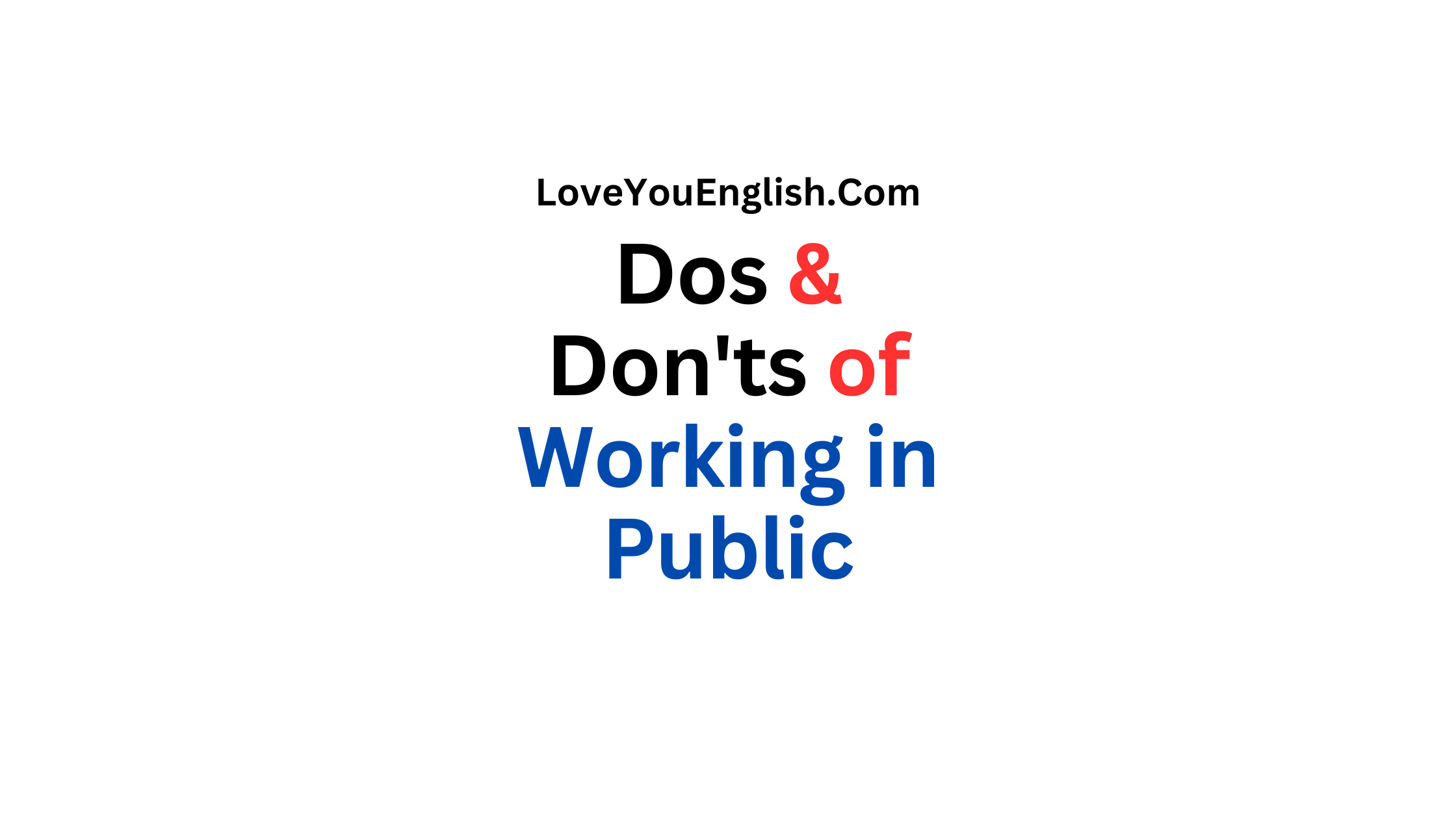The Dos and Don’ts of Working in Public
The Dos and Don’ts of Working in Public
With more people embracing remote work and the lifestyle of digital nomads, many are opting to work in public places like cafes, libraries, coworking spaces, and parks.
Working in these environments can provide a refreshing change of scenery, chances to meet new people, and access to facilities that you might not have at home.
But it also brings its own set of challenges and rules to follow.
I will highlight the important dos and don’ts of working in public areas, helping you stay productive, courteous, and make the most of your remote work journey.
We’ll look at the best practices for various public workspaces, how to deal with common problems, tech and equipment suggestions, and tips for keeping your focus and efficiency high.
Whether you’re an experienced digital nomad or just starting with remote work, keep reading to discover how to excel at working in public.
The Dos of Working in Public
Do: Choose the Right Location
One of the most important factors in having a positive experience working in public is choosing the right location.
Consider the following when selecting a spot:
- Noise level: If you need quiet to focus, a bustling cafe may not be ideal. Libraries and certain coworking spaces often offer quieter environments.
- WiFi quality: Reliable internet is crucial for most remote work. Check reviews or ask staff about WiFi speeds and reliability.
- Power outlets: Make sure there are accessible outlets to keep your devices charged.
- Comfort: Ergonomic seating and good lighting are important for longer work sessions.
- Amenities: Consider what you’ll need, like access to printers, meeting rooms, or food/beverages.
- Time limits: Some places may have restrictions on how long you can stay.
Do your research and try out different spots to find locations that suit your work style and needs.
Do: Be Considerate of Others
When working in shared spaces, it’s crucial to be mindful of those around you.
Some keyways to show consideration include:
- Use headphones when listening to audio or on calls.
- Keep your voice down during phone or video conversations.
- Don’t spread out excessively or monopolize large tables if space is limited.
- Clean up after yourself and don’t leave trash or mess behind.
- Be aware of strong food odors that may bother others.
- Respect the space’s intended purpose (e.g. don’t treat a quiet study area like a social coworking space).
Do: Come Prepared
Having the right gear and supplies will make your public work sessions much smoother.
Consider packing:
- Laptop and charger
- Noise-cancelling headphones
- Portable battery pack
- Notepad and pens
- Water bottle
- Snacks (if allowed in the space)
- Any necessary cables or adapters
- Hand sanitizer and masks (as needed)
Being prepared allows you to settle in quickly and stay focused without constantly needing to track down supplies or leave to get essentials.
Do: Support the Businesses You Work From
If you’re regularly working from cafes, restaurants, or other businesses, it’s important to be a good patron.
This means making purchases, tipping well, and not overstaying your welcome.
Even if a purchase isn’t strictly required, buying food or drinks every couple of hours is a good way to show your appreciation for using the space.
For coworking spaces or membership-based locations, familiarize yourself with and follow their policies and guidelines.
Do: Practice Good Tech Etiquette
In addition to being considerate of noise levels, there are other tech-related etiquette points to keep in mind:
- Turn off notification sounds on your devices.
- Be mindful of screen privacy, especially when handling sensitive information.
- Don’t watch videos or other multimedia without headphones.
- Avoid taking up prime outlet locations for extended periods if others are waiting.
- Be cautious about using public WiFi for sensitive tasks – consider using a VPN.
Do: Set Boundaries and Communicate
When working in public, you may encounter distractions or interruptions from others.
It’s okay to politely set boundaries:
- Use body language (like wearing headphones) to signal you’re focused on work.
- If someone tries to strike up a conversation, it’s fine to explain that you’re working and can’t chat.
- For coworking spaces, communicate with others about shared resources or potential disturbances.
- Let cafe staff know if you plan on staying for an extended period, so they can plan accordingly.
Clear communication can help prevent misunderstandings and ensure a positive experience for everyone.
Do: Take Advantage of the Change of Scenery
One of the benefits of working in public is the opportunity for a change of pace and new stimuli.
Take advantage of this by:
- Using breaks to people-watch or observe your surroundings for creative inspiration.
- Engaging in casual networking or conversations during appropriate times.
- Exploring the local area during lunch breaks or between tasks.
- Switching up your location to match your work needs (e.g. a lively cafe for brainstorming, a quiet library for focused writing).
Do: Prioritize Security and Privacy
Working in public comes with some inherent security risks.
Protect yourself and your work by:
- Using a privacy screen on your laptop to prevent visual hacking.
- Being cautious about accessing sensitive information on public WiFi.
- Never leaving your devices unattended, even for quick bathroom breaks.
- Using strong passwords and two-factor authentication.
- Backing up your work regularly in case of theft or loss.
- Being mindful of your surroundings when discussing confidential matters.
Do: Stay Organized
Keeping your temporary workspace organized is key to productivity and courtesy.
Some tips:
- Use a small bag or organizer to keep cords and small items tidy.
- Have a designated spot for important items like your wallet and keys.
- Clean up your area regularly, especially if you’re moving between tasks or locations.
- Use digital tools to minimize physical clutter (e.g. note-taking apps instead of multiple notebooks).
Do: Be Flexible and Adaptable
Public workspaces can be unpredictable, so it’s important to stay flexible.
Be prepared to:
- Move to a different spot if your original location becomes too noisy or crowded.
- Have backup work plans in case of WiFi issues or other tech problems.
- Adjust your schedule if your chosen location is busier than expected.
- Switch to offline work if necessary (have some tasks that don’t require internet access ready).
More topics:
- Top 10 Interview Tips That Will Help You Get Hired
- How to Write a Complaint Email in 8 Steps
- Top 10 Personal Interview Questions (Plus Tips for Answering)
- Tips for Successful Online Video Interviews
- How To Make a Great Impression in a Job Interview
The Don’ts of Working in Public
Don’t: Treat Public Spaces Like Your Private Office
While it’s great to make yourself comfortable, remember that you’re in a shared space.
Avoid:
- Taking loud personal or professional calls without stepping outside.
- Having extended video meetings without using headphones.
- Removing shoes or engaging in other overly casual behaviors.
- Using speaker phone or playing audio without headphones.
- Monopolizing large amounts of space with your belongings.
Don’t: Overstay Your Welcome
Be mindful of how long you’re occupying a space, especially in businesses like cafes.
Some don’ts include:
- Sitting for hours while nursing a single small purchase.
- Staying past closing time or when staff are clearly trying to clean up.
- Monopolizing prime seating during busy periods if you’ve been there a long time.
- Ignoring time limits or usage policies in places like libraries or coworking spaces.
Don’t: Neglect Basic Hygiene and Cleanliness
Maintaining cleanliness is crucial when sharing space with others:
- Don’t leave trash, crumbs, or mess behind when you leave.
- Avoid eating messy or strong-smelling foods that might bother others.
- Don’t put your feet up on furniture or otherwise treat the space disrespectfully.
- If you spill something, clean it up immediately or notify staff if you need help.
Don’t: Forget About Ergonomics
While working in public spaces can be convenient, it’s important not to sacrifice your physical health:
- Don’t hunch over your laptop for hours without breaks.
- Avoid working in positions that strain your neck, back, or wrists.
- Don’t forget to stand up and stretch periodically.
- If possible, use ergonomic accessories like a laptop stand or portable keyboard.
Don’t: Rely Solely on Public WiFi for Sensitive Work
Public WiFi networks can be vulnerable to security breaches:
- Don’t access sensitive financial or personal information without using a VPN.
- Avoid doing work that requires handling confidential client or company data on public networks.
- Don’t leave your devices’ WiFi or Bluetooth on and connecting automatically to unknown networks.
Don’t: Interrupt or Distract Others
Respect others’ space and concentration:
- Don’t strike up conversations with people who are clearly focused on work.
- Avoid making unnecessary noise or movements that might distract others.
- Don’t ask others to watch your belongings while you step away.
- Refrain from taking phone calls at your table – step outside instead.
Don’t: Forget to Support Local Businesses
If you’re using a business’s space and amenities:
- Don’t bring outside food or drinks into cafes or restaurants.
- Avoid using their utilities (like electricity or WiFi) without making purchases.
- Don’t take up large amounts of space during peak business hours without buying accordingly.
Don’t: Neglect Your Own Productivity
While working in public can be stimulating, it’s important to stay focused:
- Don’t choose locations that you know are too distracting for you.
- Avoid spending more time socializing or people-watching than actually working.
- Don’t forget to set clear goals and time limits for your work sessions.
- Avoid the temptation to constantly change locations if it’s impacting your productivity.
Don’t: Ignore Local Customs or Etiquette
If you’re working in public spaces while traveling:
- Don’t assume that what’s acceptable in your home country is okay everywhere.
- Avoid loud or boisterous behavior that might be considered rude in the local culture.
- Don’t dress inappropriately for the setting or local customs.
- Avoid using VPNs or accessing content that might be restricted or illegal in certain countries.
Don’t: Compromise on Personal Safety
While focusing on work, don’t forget about your personal safety:
- Don’t leave valuables visible or unattended, even for a moment.
- Avoid working in isolated or poorly lit areas, especially late at night.
- Don’t share too much personal information with strangers you meet.
- Avoid wearing headphones in both ears in public spaces where you need to stay alert to your surroundings.
Conclusion
Working in public can be a fun and productive way to get things done if you approach it the right way.
By keeping in mind some important dos and don’ts, you can make the space better for yourself and everyone else, while also enjoying the different places you work in.
Every public workspace has its own vibe, so it’s important to pay attention and change how you act based on where you are.
With time, you’ll get really good at understanding how to behave in public workspaces, whether you’re at a local coffee shop or a coworking spot far away.
Take advantage of the cool chances that come with working in public areas, but always remember to respect the shared space and think about others around you.
By learning these skills, you’ll be ready to succeed in the changing world of remote and flexible jobs.







